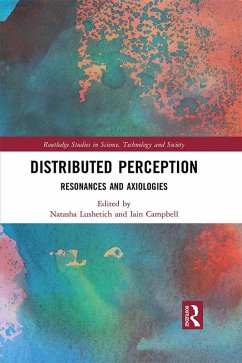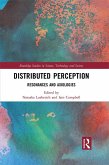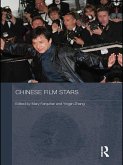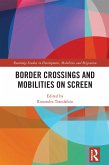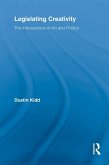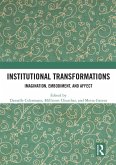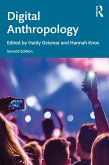Distributed Perception (eBook, PDF)
Resonances and Axiologies
Redaktion: Lushetich, Natasha; Campbell, Iain
43,95 €
43,95 €
inkl. MwSt.
Sofort per Download lieferbar

22 °P sammeln
43,95 €
Als Download kaufen

43,95 €
inkl. MwSt.
Sofort per Download lieferbar

22 °P sammeln
Jetzt verschenken
Alle Infos zum eBook verschenken
43,95 €
inkl. MwSt.
Sofort per Download lieferbar
Alle Infos zum eBook verschenken

22 °P sammeln
Distributed Perception (eBook, PDF)
Resonances and Axiologies
Redaktion: Lushetich, Natasha; Campbell, Iain
- Format: PDF
- Merkliste
- Auf die Merkliste
- Bewerten Bewerten
- Teilen
- Produkt teilen
- Produkterinnerung
- Produkterinnerung

Bitte loggen Sie sich zunächst in Ihr Kundenkonto ein oder registrieren Sie sich bei
bücher.de, um das eBook-Abo tolino select nutzen zu können.
Hier können Sie sich einloggen
Hier können Sie sich einloggen
Sie sind bereits eingeloggt. Klicken Sie auf 2. tolino select Abo, um fortzufahren.

Bitte loggen Sie sich zunächst in Ihr Kundenkonto ein oder registrieren Sie sich bei bücher.de, um das eBook-Abo tolino select nutzen zu können.
This transdisciplinary volume uses notions of resonance and axiology to analyse distributed perception in the form of geological, animal, bacterial, machinic and human co-perceptibilities. In so doing they show that distributed perception is an important for addressing the emergence, persistence, and development of human-animal-machine relations.
- Geräte: PC
- mit Kopierschutz
- eBook Hilfe
Andere Kunden interessierten sich auch für
![Distributed Perception (eBook, ePUB) Distributed Perception (eBook, ePUB)]() Distributed Perception (eBook, ePUB)43,95 €
Distributed Perception (eBook, ePUB)43,95 €![Chinese Film Stars (eBook, PDF) Chinese Film Stars (eBook, PDF)]() Chinese Film Stars (eBook, PDF)57,95 €
Chinese Film Stars (eBook, PDF)57,95 €![Image-Making-India (eBook, PDF) Image-Making-India (eBook, PDF)]() Paolo Silvio Harald FaveroImage-Making-India (eBook, PDF)54,95 €
Paolo Silvio Harald FaveroImage-Making-India (eBook, PDF)54,95 €![Border Crossings and Mobilities on Screen (eBook, PDF) Border Crossings and Mobilities on Screen (eBook, PDF)]() Border Crossings and Mobilities on Screen (eBook, PDF)41,95 €
Border Crossings and Mobilities on Screen (eBook, PDF)41,95 €![Legislating Creativity (eBook, PDF) Legislating Creativity (eBook, PDF)]() Dustin KiddLegislating Creativity (eBook, PDF)58,95 €
Dustin KiddLegislating Creativity (eBook, PDF)58,95 €![Institutional Transformations (eBook, PDF) Institutional Transformations (eBook, PDF)]() Institutional Transformations (eBook, PDF)43,95 €
Institutional Transformations (eBook, PDF)43,95 €![Digital Anthropology (eBook, PDF) Digital Anthropology (eBook, PDF)]() Digital Anthropology (eBook, PDF)33,95 €
Digital Anthropology (eBook, PDF)33,95 €-
-
-
This transdisciplinary volume uses notions of resonance and axiology to analyse distributed perception in the form of geological, animal, bacterial, machinic and human co-perceptibilities. In so doing they show that distributed perception is an important for addressing the emergence, persistence, and development of human-animal-machine relations.
Dieser Download kann aus rechtlichen Gründen nur mit Rechnungsadresse in A, B, BG, CY, CZ, D, DK, EW, E, FIN, F, GR, HR, H, IRL, I, LT, L, LR, M, NL, PL, P, R, S, SLO, SK ausgeliefert werden.
Produktdetails
- Produktdetails
- Verlag: Taylor & Francis eBooks
- Seitenzahl: 304
- Erscheinungstermin: 29. Dezember 2021
- Englisch
- ISBN-13: 9781000521665
- Artikelnr.: 63072669
- Verlag: Taylor & Francis eBooks
- Seitenzahl: 304
- Erscheinungstermin: 29. Dezember 2021
- Englisch
- ISBN-13: 9781000521665
- Artikelnr.: 63072669
- Herstellerkennzeichnung Die Herstellerinformationen sind derzeit nicht verfügbar.
Natasha Lushetich is Professor of Contemporary Art and Theory at the University of Dundee and AHRC Fellow (2020 - 2021). Her research is interdisciplinary and focuses on intermedia; biopolitics and performativity; the status of sensory experience in cultural knowledge; hegemony and complexity. Her books include Fluxus: The Practice of Non-Duality (Rodopi 2014), Interdisciplinary Performance (Pagrave 2016), The Aesthetics of Necropolitics (Rowman and Littlefield 2018), Beyond Mind , a special issue of Symbolism (De Gruyter 2019) and Big Data - A New Medium? (Routledge 2020). Iain Campbell is an interdisciplinary researcher based in Edinburgh. He is Postdoctoral Rsearch Associate on the AHRC project The Future of Indeterminacy: Datification, Memory, Bio-Politics at the University of Dundee. He has written on topics across philosophy, music, sound studies, and art theory for publications including parallax, Deleuze and Guattari Studies, Sound Studies, and Contemporary Music Review. He is an associate member of the Scottish Centre for Continental Philosophy, and is part of the editorial board of Evental Aesthetics.
Introduction Part I: Entanglement 1. Relational Philosophy: The Stars are
Our Relatives 2. Turning Around and Upside Down: The Nomadic Rhythms of
Rain Ants in Sarayaku 3. Do Media Have a Sense of Time? Chrono-technical
Interoception 4. Oscilloscopes, Slide Rules and Nematodes: Towards
Heterogenetic Perception in/of AI 5. Composing with Resonance, Sounding the
Inaudible and Listening for More-than-One 6. The Discrete Charm of Systems
Theories: Cybernetic Intelligence and Posthuman Art Environments Part II:
Plasticity 7. Unstable Brains and Ordered Societies: On the Conceptual
Origins of Plasticity, ca 1900 8. The Human and Nonhuman in the Capitalist
production of Subjectivity 9. Resonance Between Sense, Plasticity and
Biosemiosis 10. How We Never Became Posthuman: Homeostasis as Conflict from
Claude Bernard to Norbert Wiener 11. Intra-Action in Data-Driven Systems: A
Case Study in Creative Praxis Part III: Organology 12.
Becoming-Distributed Matter: Dreaming and Extended Relationality Among
Indigenous Australians 13. Two Painted Flies: Improvised Arts of Perception
in Uexküll's Picture Book of Invisible Worlds 14. From Physiological
Aesthetics to Anthropological Poetics: Activating the Pictographs of Cerro
Azul 15. The Relativity of Life: Cinema as Time Microscope 16. Battlebots,
Machine Surrogates and the Organology of Violence Televisual Entertainment
17. Autobiographing our Computing Organs: Rereading Pastw Uses of Intel
CPUs as Xenotransplantation Concluding Thoughts
Our Relatives 2. Turning Around and Upside Down: The Nomadic Rhythms of
Rain Ants in Sarayaku 3. Do Media Have a Sense of Time? Chrono-technical
Interoception 4. Oscilloscopes, Slide Rules and Nematodes: Towards
Heterogenetic Perception in/of AI 5. Composing with Resonance, Sounding the
Inaudible and Listening for More-than-One 6. The Discrete Charm of Systems
Theories: Cybernetic Intelligence and Posthuman Art Environments Part II:
Plasticity 7. Unstable Brains and Ordered Societies: On the Conceptual
Origins of Plasticity, ca 1900 8. The Human and Nonhuman in the Capitalist
production of Subjectivity 9. Resonance Between Sense, Plasticity and
Biosemiosis 10. How We Never Became Posthuman: Homeostasis as Conflict from
Claude Bernard to Norbert Wiener 11. Intra-Action in Data-Driven Systems: A
Case Study in Creative Praxis Part III: Organology 12.
Becoming-Distributed Matter: Dreaming and Extended Relationality Among
Indigenous Australians 13. Two Painted Flies: Improvised Arts of Perception
in Uexküll's Picture Book of Invisible Worlds 14. From Physiological
Aesthetics to Anthropological Poetics: Activating the Pictographs of Cerro
Azul 15. The Relativity of Life: Cinema as Time Microscope 16. Battlebots,
Machine Surrogates and the Organology of Violence Televisual Entertainment
17. Autobiographing our Computing Organs: Rereading Pastw Uses of Intel
CPUs as Xenotransplantation Concluding Thoughts
Introduction Part I: Entanglement 1. Relational Philosophy: The Stars are
Our Relatives 2. Turning Around and Upside Down: The Nomadic Rhythms of
Rain Ants in Sarayaku 3. Do Media Have a Sense of Time? Chrono-technical
Interoception 4. Oscilloscopes, Slide Rules and Nematodes: Towards
Heterogenetic Perception in/of AI 5. Composing with Resonance, Sounding the
Inaudible and Listening for More-than-One 6. The Discrete Charm of Systems
Theories: Cybernetic Intelligence and Posthuman Art Environments Part II:
Plasticity 7. Unstable Brains and Ordered Societies: On the Conceptual
Origins of Plasticity, ca 1900 8. The Human and Nonhuman in the Capitalist
production of Subjectivity 9. Resonance Between Sense, Plasticity and
Biosemiosis 10. How We Never Became Posthuman: Homeostasis as Conflict from
Claude Bernard to Norbert Wiener 11. Intra-Action in Data-Driven Systems: A
Case Study in Creative Praxis Part III: Organology 12.
Becoming-Distributed Matter: Dreaming and Extended Relationality Among
Indigenous Australians 13. Two Painted Flies: Improvised Arts of Perception
in Uexküll's Picture Book of Invisible Worlds 14. From Physiological
Aesthetics to Anthropological Poetics: Activating the Pictographs of Cerro
Azul 15. The Relativity of Life: Cinema as Time Microscope 16. Battlebots,
Machine Surrogates and the Organology of Violence Televisual Entertainment
17. Autobiographing our Computing Organs: Rereading Pastw Uses of Intel
CPUs as Xenotransplantation Concluding Thoughts
Our Relatives 2. Turning Around and Upside Down: The Nomadic Rhythms of
Rain Ants in Sarayaku 3. Do Media Have a Sense of Time? Chrono-technical
Interoception 4. Oscilloscopes, Slide Rules and Nematodes: Towards
Heterogenetic Perception in/of AI 5. Composing with Resonance, Sounding the
Inaudible and Listening for More-than-One 6. The Discrete Charm of Systems
Theories: Cybernetic Intelligence and Posthuman Art Environments Part II:
Plasticity 7. Unstable Brains and Ordered Societies: On the Conceptual
Origins of Plasticity, ca 1900 8. The Human and Nonhuman in the Capitalist
production of Subjectivity 9. Resonance Between Sense, Plasticity and
Biosemiosis 10. How We Never Became Posthuman: Homeostasis as Conflict from
Claude Bernard to Norbert Wiener 11. Intra-Action in Data-Driven Systems: A
Case Study in Creative Praxis Part III: Organology 12.
Becoming-Distributed Matter: Dreaming and Extended Relationality Among
Indigenous Australians 13. Two Painted Flies: Improvised Arts of Perception
in Uexküll's Picture Book of Invisible Worlds 14. From Physiological
Aesthetics to Anthropological Poetics: Activating the Pictographs of Cerro
Azul 15. The Relativity of Life: Cinema as Time Microscope 16. Battlebots,
Machine Surrogates and the Organology of Violence Televisual Entertainment
17. Autobiographing our Computing Organs: Rereading Pastw Uses of Intel
CPUs as Xenotransplantation Concluding Thoughts
